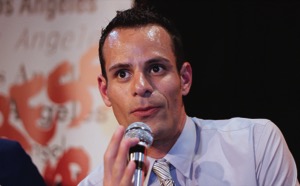
When news of Will X. Walters’ suicide broke there was shock and anger throughout the LGBTQ community and beyond – shock at this senseless waste of life and anger that a simple apology could have prevented these prolonged proceedings many years before.
At a memorial service, Jan. 7 powerful eulogies were given in celebration of the life of Walters. Many described the service as “amazing” even “uplifting” in the midst of tragedy. But still the rumors of the reasons behind Walters’ death were rife and speculation about why he decided to take his life in late December, 2016 has centered on a theory that the 35-year-old civil rights leader felt overwhelmed by a legal bill of nearly $1 million.
“Nothing could be further from the truth,” Walters’ friend, Thom Senzee, told San Diego LGBT Weekly. “Will did not owe a penny in legal fees because his bill was fully paid by donors to a legal fund.”
None of those donors gave with an expectation to be paid back, regardless of whether Walters won in court, he said.
According to Senzee, Walters received contributions to fund his lawsuit against the San Diego Police Department from several members of San Diego’s LGBT and equality-activism communities. But the lion’s share came from longtime San Diego philanthropist and close friend, Benjamin F. Dillingham III.
While the million-dollar figure has been bandied about in the media with some regularity, according to the man who wrote the checks for most of Walters’ legal bills, the actual cost for suing five San Diego Police Officers led by former Lieutenant (now Assistant Chief) David Nisleit, whom Walters had claimed violated his 14th Amendment rights, was actually lower.
“Will’s attorney, Chris Morris donated a portion of his services by providing us with a significant discount,” Dillingham told LGBT Weekly. “I am grateful to Chris for his generosity and excellent representation in Will’s case.”
Nevertheless, Senzee says he has been questioned by colleagues in the media about how a two-week trial could cost close to $1 million, or even hundreds of thousands of dollars with a significant discount.
“What’s been reported as close to a million dollars is the pre-discount fee, the entirety of which the city could have been liable for if the proper verdict had actually been reached,” Senzee said.
“Remember, just a two-week trial this was not. It was an unnecessary, five-year battle that at any time could have been stopped with a simple apology from the city along with a promise by SDPD to enforce the law equally at gay and straight events alike – that’s all Will Walters ever asked for.
“It turns out that it costs a lot of money to sue the police if they violate your rights,” Senzee continued. “Most people don’t have the money to stand up for their rights. When someone does, the rest of us better hope and pray they win for our sake.”
Back in May of last year, in an interview with LGBT Weekly’s Victor Hoff, Will Walters said something that makes his death by suicide even more tragic nine months later: “I just want my life back.”
About a year before that, after hearing the Walters’ appeal, 9th Circuit Court of Appeals Judge Harry Pregerson posited to his fellow jurists, “Why don’t we just say that this was a bad call by a police officer?”
Looking back, Walters’ surviving friends, relatives and supporters, including Ben Dillingham, Thom Senzee and Chris Morris point to testimony that indicates the late civil rights activist was permanently scarred by his arrest.
According to those who attended the trial, and as transcripts confirm, the testimony of Will Walters’ psychologist was among some of the proceeding’s most compelling. It revealed that Walters suffered from post-traumatic stress disorder.
“I dropped Will off at Pride the day he was arrested,” recalls Dillingham. “There was a Will Walters before his arrest, and a Will Walters after the arrest. One was vivacious and confident; the Will I knew afterward was a person that David Nisleit and his officers had left robbed of pride and confidence in being a gay man.”
According to Dillingham, the jury’s perplexing verdict ultimately denied Walters vindication.
“Will could see no honorable way to reconstitute his reputation in the future,” he told LGBT Weekly. “Will had an overwhelming feeling of guilt that he had let everyone down on a matter critical to everyone’s liberty – especially in the LGBT community.”
During his memorial service, attended by about 100 friends, relatives and members of the public, a message from Walters’ mother, Darlene Yanez Walters of Austin, Texas, who sat in the front row at the MCC Church, was read by City Commissioner Nicole Murray Ramirez. Part of the message read,
To believe that in this space we share with each other that living a life of kindness and respect for others is the true measure of a person’s success and worth. You, my son, are the wealthiest and most successful man in this universe and beyond.
According to several sources interviewed for this article, Will Walters’ message of equality is likely to continue beyond his passing, perhaps through his nonprofit organization, FreeWillUSA. There have even been rumblings about a documentary film about Walters’ struggle for equal enforcement of the law.
“I’m not ready to confirm that right now, but I think it goes without saying that Will’s story is worthy of remembering and documenting,” said Senzee.











